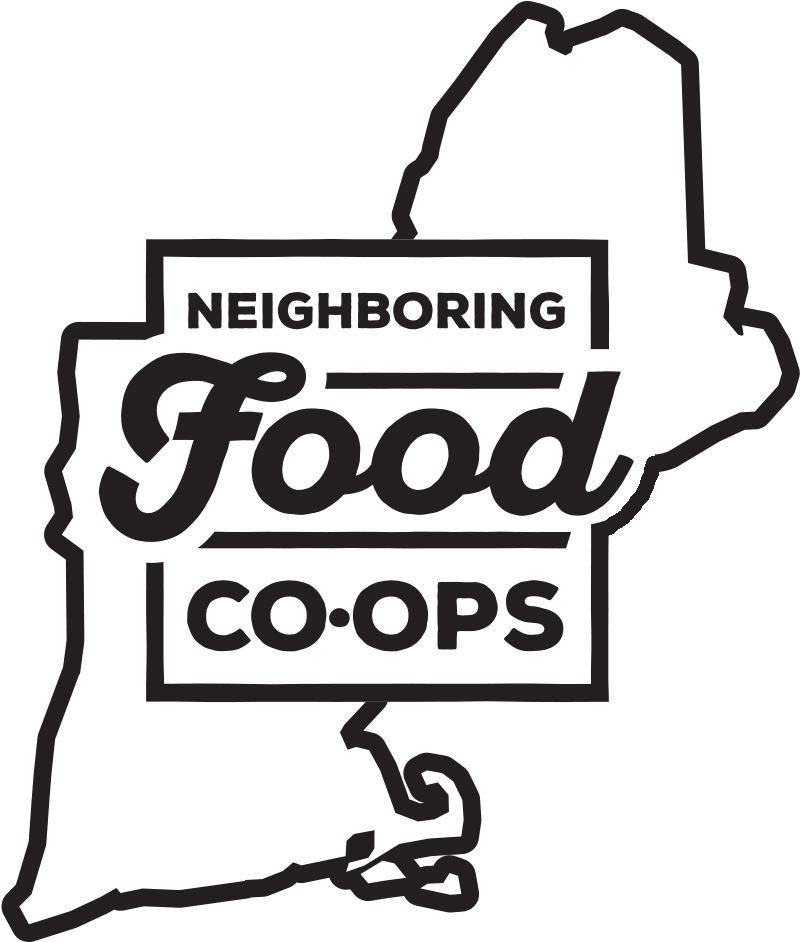 Your Neighboring Food Co-ops: Your Neighboring Food Co-ops:
Locally Owned by More Than
100,000 People Like You! |
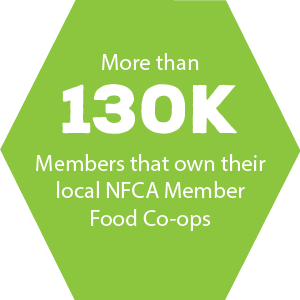 As the Neighboring Food Co-op Association celebrates our Seventh Annual Meeting this Saturday, March 17, we are looking forward to welcoming Doug O’Brien, President & CEO of the National Cooperative Business Association, CLUSA International, as our keynote. Doug will speak on the theme of “Building an Inclusive Economy: The Co-operative Difference,” sharing his thoughts on the potential for the co-op movement to be leaders in growing a more inclusive economy. We look forward to an inspiring day of peer networking, workshops, and presentations designed to support the shared success of our Member Food Co-ops and Start-Ups.
As the Neighboring Food Co-op Association celebrates our Seventh Annual Meeting this Saturday, March 17, we are looking forward to welcoming Doug O’Brien, President & CEO of the National Cooperative Business Association, CLUSA International, as our keynote. Doug will speak on the theme of “Building an Inclusive Economy: The Co-operative Difference,” sharing his thoughts on the potential for the co-op movement to be leaders in growing a more inclusive economy. We look forward to an inspiring day of peer networking, workshops, and presentations designed to support the shared success of our Member Food Co-ops and Start-Ups.
If NFCA Member Co-ops want to send representatives/additional reps to the Annual Meeting, email Bonnie, bonnie@nfca.coop, for more information.
Note: This is from “Co-op Corner” reprinted from the Spring Edition of Green Living Journal.
By Erbin Crowell
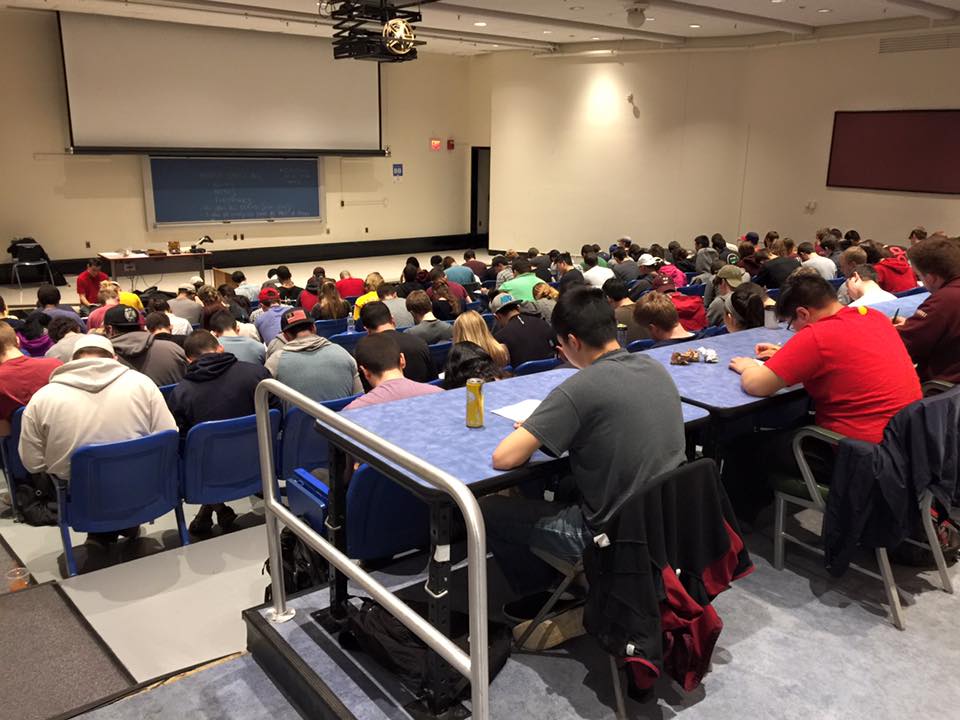 “As a lecturer at the University of Massachusetts, I find that the first few weeks of my class on the co-operative movement usually involve discussion of the meaning of a few basic words. A co-operative is a business, so why are we talking about ‘membership?’ Aren’t businesses owned by entrepreneurs or investors? What is ‘patronage’ — and why does it matter? If the profit motive is the engine of our economy, what is ‘surplus’ or ‘net savings?’
“As a lecturer at the University of Massachusetts, I find that the first few weeks of my class on the co-operative movement usually involve discussion of the meaning of a few basic words. A co-operative is a business, so why are we talking about ‘membership?’ Aren’t businesses owned by entrepreneurs or investors? What is ‘patronage’ — and why does it matter? If the profit motive is the engine of our economy, what is ‘surplus’ or ‘net savings?’
I was reminded of this recently as I came across a pamphlet titled Learning the Language for Study and Action. Originally published in 1940 by the Cooperative League of the USA (now the National Cooperative Business Association) and revised in 1971, the Introduction is surprisingly relevant: ‘Business mergers are widespread; economic power is highly concentrated,’ the authors note. ‘Can we really have much free enterprise in our country if the average citizen doesn’t know what’s going on?’
Co-ops began as a grassroots economic movement with a focus on economic literacy. In keeping with this history, education remains a basic principle of the International Co-operative Alliance’s (ICA) Statement on the Co-operative Identity, which affirms that co-ops must work to ‘inform the general public — particularly young people and opinion leaders — about the nature and benefits of co-operation.’
Today, the co-op business model is enshrined in our state laws, providing a legal framework to empower people to work together to meet their needs. From farmer co-ops to food co-ops, worker co-ops to credit unions, housing co-ops to artisan co-ops, there are an estimated 40,000 co-operatives in the US, active in all aspects of our economy.
A central challenge for co-ops, however, is that students do not generally learn about them in our schools, colleges, and universities — much less our business schools. As a result, co-op education must begin with the terms we use to describe co-operative enterprises and how they operate.
On the other hand, this is also an opportunity. Learning a new language offers new ways of seeing the world, and the words that we use to talk about economics are no different. In this sense, co-op terminology is best seen as a tool for communicating what makes this business model unique.
For example, ‘membership’ in a co-op usually involves the purchase a membership share. This makes you an owner of the enterprise — but only in a collective sense. What can be difficult to communicate is that this ownership does not give a member individual property rights that can be sold, or any individual control over the business as a sole proprietor has. Rather, membership confers on the holder specific benefits as a ‘user’ of its products and services, and a role in the democratic governance of the enterprise.
‘In essence, membership means that there should be a special relationship between the co-operative and the people whose needs it is established to serve,’ reads the ICA’s Guidance Notes on the Co-operative Principles. ‘Co-operatives are user-driven organizations… established by, owned by and operating to meet their members’ common economic, social and cultural needs and aspirations.’
Co-ops are best described as not-for-profit enterprises, as opposed to for-profits or non-profits, in that they are designed to operate at cost, generating sufficient profit to meet member needs and goals rather than maximizing returns for investors. (Co-ops may have investors but they have no vote in the business and their financial return is limited.) Any money left over at the end a given year — in basic terms, the difference between income and expenses — is often described as ‘net savings’ or ‘surplus,’ or what conventional businesses call ‘net profit.’
So, why not just use conventional business terms? The authors of Learning the Language point out that surplus is ‘not true profit, to be paid to the absentee owners of invested capital. In a co-operative, it is ‘savings’ to be returned to active user-owners, in proportion to their use of the business — or used to strengthen their co-operative.’ Therefore, the words that we choose are an opportunity to help ‘educate members and the public to understand co-op principles and objectives.’
This brings us to ‘patronage.’ In contrast to conventional businesses, ownership of a member share in a co-op does not entitle the member to a financial return. Rather, as ‘patrons’ or ‘users’ of their shared enterprise, members receive an economic return in the form of desired products, services, and/or employment. They also receive social returns such as stronger communities, sustainable food systems, and more stable local economies, in keeping with the policies that they help establish.
Any financial resources left over at the end of a given fiscal year are reinvested in the co-operative to improve these services or expand the business, or returned to members as ‘patronage rebates’ or ‘refunds.’ In contrast to an investor-owned business, in which profit is distributed based on how much capital is owned, a co-op may return a portion of its surplus to it members on the basis of their patronage, or use of its products and services. In a consumer co-op, this means a member’s purchases; in a producer co-op, the amount of product processed and marketed through the business; and in a worker co-op, the labor contributed to the business. (To make things even more interesting, ‘multistakeholder’ or ‘solidarity’ co-ops can have a variety of member types with different ‘patronage’ relationships to the enterprise.)
Language matters, demonstrated by the fact that in many states, it is illegal to include the term ‘co-op’ or ‘co-operative’ in the name of a business unless it is incorporated as such and operates in keeping with co-operative statutes. The words we use can also play a powerful role in empowering people to envision a better, more participatory, and inclusive economy:
‘How can we restore democratic control over American business if the people themselves do not understand business?’ the authors ask in Learning the Language. ‘We need millions of Americans who understand corporate business. And where can an American gain better training than belong to a co-operative…? Indeed, it’s almost the only way many Americans ever get a practical business education.’”
—
Erbin Crowell is Executive Director of the Neighboring Food Co-op Association, serves on the Board of Directors of NCBA CLUSA, and is an adjunct lecturer at UMASS Amherst where he teaches courses on the co-operative movement. He may be contacted at erbin@nfca.coop.
Co-op Difference: Business Transparency
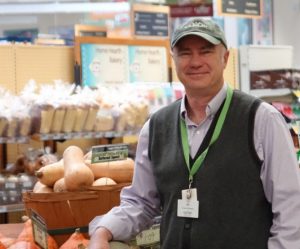
In a time of diminishing transparency and profit making at any cost in the business world, co-ops stand out for their accountability and commitment to evaluating their progress as it relates to the results they aim to achieve in the world.
NFCA Member, Co-op Food Stores, shares one of their business practices, a Scorecard, to evaluate how well they are meeting their “Ends,” the end results they aim to achieve in the world.
“Dear Co-op Members,
I recently met with a team of employees to work on compiling the Scorecard, a document that provides a brief, information-rich snapshot of the work we do at our Co-op over the course of a year. Our Scorecard shows us how much progress we’re making toward our Ends, a series of statements often summarized as “the end results we aim to achieve in the world.” Our Board of Directors, which represents our membership, crafted our End statements years ago. Our cooperative strives to work toward our Ends every day. Our Scorecard lets us see how we’re doing.
In our Scorecard, we collect metrics from the previous year, then share those metrics with all our employees and member-owners. It’s an excellent tool, and I particularly enjoy the conversations and teamwork it takes to pull all the information together. When we look ahead at where we’re going, sometimes it’s easy to forget where we’ve been. The Scorecard is an important reminder of what we’ve accomplished together.
I’ve written before about transparency, and how it can be nothing more than a buzzword unless people work together to embrace it. If anything describes our Scorecard, it’s transparency. What the Scorecard symbolizes is as important as the information it contains. To create this document, our employees and their teams must embrace a philosophy of transparency, keeping us accountable to one another and true to our collectively owned identity.
Never forget that in a cooperative, we are all accountable to each other. No individual rises above the masses. No matter who we are and what we do here, making progress as a business, furthering socioeconomic justice in our food system, and putting into practice the principles of cooperation unites us all. So when you read the Scorecard, and I hope you do, I encourage you to remember that behind the transparent metrics are many people working together for the Co-op Ends and, by extension, for the common good.
My thanks to all the members who make our work possible. Want to talk more about this or anything else? Reach out to me anytime. My door is always open to you.”
—Ed Fox, General Manager of Co-op Food Stores

Thanks to CoBank for their support of our Neighboring Food Co-ops
Why Co-ops Earn Workplace Awards
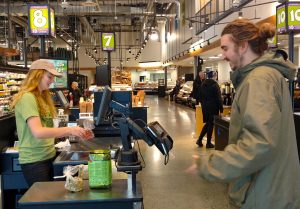
The member food co-ops of Neighboring Food Co-op Association have a dramatic impact on our regional economy, including providing stable employment and good jobs.
Congrats to Member Co-op City Market/Onion River Co-op for being recognized with two workplace awards, Best Places to Work in Vermont 2018 and a Governor’s Excellence in Worksite Wellness Award.
Vermont Business Magazine and the Vermont Chamber of Commerce recently announced the top 50 Best Places to Work in Vermont 2018. City Market has been recognized in the “large businesses” category (250+ employees). The awards program was created in 2006 and is presented in partnership with the Society for Human Resource Management, Vermont State Council, (SHRM), the Vermont Department of Labor and the Vermont Department of Commerce and Community Development and Best Companies Group. This statewide survey and awards program was designed to identify, recognize and honor the best places of employment in Vermont, benefiting the state’s economy, its workforce and businesses.
Companies from across the state entered the two-part process to determine the Best Places to Work in Vermont. The first part consisted of evaluating each nominated company’s workplace policies, practices, and demographics. This part of the process was worth approximately 25% of the total evaluation. The second part consisted of an employee survey to measure the employee experience. This part of the process was worth approximately 75% of the total evaluation. The combined scores determined the top companies and the final ranking. The final rankings for each category will be announced at a special awards presentation in March.
In addition, City Market has been selected to receive a 2018 Governor’s Excellence in Worksite Wellness Award, which will also be part of a special awards presentation in March.
Council on Physical Fitness and Sports on behalf of the Governor of Vermont and are an opportunity for workplaces to be recognized for their commitment to staff wellness.
City Market’s General Manager, John Tashiro, notes, “The Co-op is honored and humbled to have received both awards this year. Staff feedback is extremely important to us so we can continue to improve and make the Co-op an even better place to work. The opening of our South End store has certainly brought many opportunities and challenges as we train additional staff and continue to create a diverse, welcoming and supportive workplace culture. It’s inspiring to see how our entire team has embraced these opportunities and these awards are certainly tangible recognition for our 350 employees.”
The Onion River Co-op is a consumer co-operative, with over 13,000 Members, selling wholesome food and other products while building a vibrant, empowered community and a healthier world, all in a sustainable manner. Now with two stores, in Downtown and the South End of Burlington, Vermont, City Market provides a large selection of local, organic, and conventional foods and thousands of Vermont-made products.
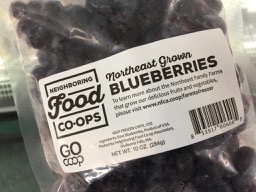 Neighboring Food Co-op Association ‘s 35+ food co-ops & start-ups are locally owned by more than 130,000 people and purchase more than $60 million from local businesses each year.
Neighboring Food Co-op Association ‘s 35+ food co-ops & start-ups are locally owned by more than 130,000 people and purchase more than $60 million from local businesses each year.
Member Food Co-op Old Creamery Co-op highlights why local roots make $ense!
“The Old Creamery Co-op values the vital contributions of small farms to our rural community and buys seasonal produce and products from local farmers and food businesses year round. Our commitment to sourcing locally provides a dependable local market for producers while providing everyone a diversity of local goods to purchase in one convenient, community-owned place.
In a 2011 study by the Maine Center for Economic Policy [1], researchers found that on a dollar-for-dollar basis, the local economic impact of independently owned businesses was significantly greater than that of national chains. Every $100 spent at locally owned businesses contributes an additional $58 to the local economy. By comparison, $100 spent at a chain store yields just $33 in local economic impact. The study concluded that if the residents of the region were to shift 10 percent of their spending from chains to locally owned businesses, it would generate $127 million in additional local economic activity and 874 new jobs.
In his book Going Local, author Michael Shuman writes, ‘Going local does not mean walling off the outside world. It means nurturing locally owned businesses which use local resources sustainably, employ local workers at decent wages, and serve primarily local consumers. It means becoming more self-sufficient and less dependent on imports. Control moves from the boardrooms of distant corporations and back into the community where it belongs.’
We believe it. Come see the diversity of local products we carry, from Splendor View Farms pastured lamb to Sawyer Farm carrots, Grace Hill Farm cheese to Tessier’s pure maple syrup.”
This Month’s Local Artisan Cheese
Hayride from Mt. Mansfield Creamery
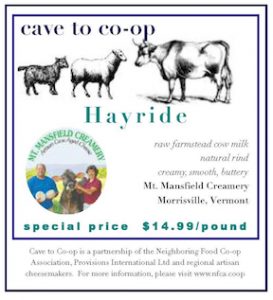
Looking for a great, local cheese to pair with white wine? Head to your local food co-op and pick up some Hayride cheese Mt. Mansfield Creamery.
Hayride is a smooth buttery cheese with small crystals and a complex flavor. Excellent in dishes with root vegetables too!
More info and recipes: https://nfca.coop/cavetoco-opmarch2018/
The project is a partnership between Provisions International and the Neighboring Food Co-op Association (NFCA) to support artisanal cheese producers in our region and make their products more easily available to co-op shoppers. Each month, a delicious local cheese is featured at a great price.
For more information on Cave to Co-op, visit: www.nfca.coop/CaveToCo-op
By Mary Castonguay, Board Member, New England Famers Union
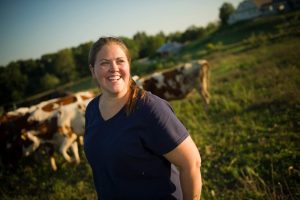
Last week I had the opportunity to attend the 116th Anniversary Convention for the National Farmers Union (NFU) in Kansas City, Missouri, as a delegate for the New England Farmers Union (NEFU) and a member of the Policy Committee. More than 450 Farmers Union members from across the country gathered for this annual event which celebrates family agriculture and includes participatory dialog on food system policy.
There was a lot of focus at this year’s convention on the opioid crisis and the sharp decline in farm profitability. With Farm Bill deliberations coming up in DC this year, the NFU Policy Committee worked very hard to review our Policy Book and make changes to improve it. When we met in January, in Washington D.C., we had the opportunity to meet with leaders in the agricultural community to discuss important issues facing family farmers. We also met with staffers of both the Senate & House Agricultural Committees. We went through every section of the Policy Book and made changes that we feel will be important to farmers and their communities here in the Northeast and across the country.
This year, the New England delegation also played a key role in updating the Policy Book to protect the co-operative business model. In addition to reaffirming NFU’s support for co-op development, new language was approved opposing any changes to state laws that would allow for control by “external investors or other interests, including Uniform Limited Co-operative Association Act statutes, that undermine the democratic nature of co-operative enterprise and the interests of producer, worker and consumer members.” The statement goes on to say that “such legislation contradicts the basic purpose of the co-operative, established by over 100 years of legal practice and precedent, as a user-owned, user-controlled entity that distributes benefit on the basis of use rather than capital invested.”
Along with the updates to the Policy Book, there were special orders approved that related to Family Farming and issues including co-ops, crop insurance, dairy, immigration, climate change, and trade policy.
“Our members put their heart and soul into this organization and into the advocacy we do for family farmers and ranchers across the country. So our grassroots policy adoption process is the main focus of our annual convention,” said NFU President Roger Johnson. “This year’s deliberations had a clear emphasis on providing meaningful support to farmers struggling amidst a sharp decline in profitability. Delegates also passed policy and special orders of business focusing on supporting family farmers’ ability to earn an honest living, protect natural resources, build up their communities, and provide for the nation.”
NEFU always works hard to ensure that the interests of the Northeast’s producers and consumers are represented in policy dialogs in DC. Protecting family farms is very important and NEFU lets local farmers have a voice at the National level. As our membership grows, so does our voice at the National level.
Please join us!
* * * *
The New England Farmers Union Needs You!
The Neighboring Food Co-op Association (NFCA) is an affiliate member of the New England Farmers Union (NEFU), representing our commitment to collaboration among consumers and our region’s family farmers and fishermen to influence food system policy and build a more vibrant, resilient and co-operative food system in New England.
If you care about where your food comes from and and want to support the people who produce it, consider joining NEFU as a Friend of the Farmer. Your membership will help ensure that our region’s producers and consumers are heard by policy makers here at home and in Washington, DC — and individual members of NFCA Member Food Co-ops can join at a special discount. For more information, please visit www.newenglandfarmersunion.org.
Co-op Calendar
For More Co-op & Food System Related Events visit:
Saturday 17, March 2018
Neighboring Food Co-op Association 7th Annual Meeting
For NFCA Member Co-ops and Partner Organizations
March 18, 2018
Northeast Organic Farming Association New Hampshire Chapter Winter Conference
Concord, NH
April 4, 2018 (Wed)
Associated Buyers Table Top Show
Portland, ME
May 2, 2018
Washington, DC
May 5, 2018
NFCA Food Co-op Start-Up Training
Keene, NH
May 31 – June 2, 2018
CCMA National Food Co-op Conference
Portland, OR
July 7, 2018
International Day of Co-operatives
August 10-12, 2018
Northeast Organic Farming Association Summer Conference
Amherst, MA
OCTOBER IS CO-OP MONTH!
Oct 3-5, 2018
NCBA CLUSA Co-op Impact Conference
Washington, DC
Oct 6, 2018
Washington, DC
October 13, 2018
CDS Consulting Co-op’s “Co-op Cafe”
Greenfield, MA
Nov 1-3rd, 2018
Co-operative Business Training with Saint Mary’s University (For Staff & Board Members)
Greenfield Community College, Greenfield, MA
March 23, 2019
Neighboring Food Co-op Association 8th Annual Meeting
For NFCA Member Co-ops and Partner Organizations
The Neighboring Food Co-op Association (NFCA) is a co-operative federation of 35 food co-ops and start-up initiatives across New England, working together toward a shared vision of a thriving co-operative economy, rooted in a healthy, just, and sustainable food system and a vibrant community of co-operative enterprise.

